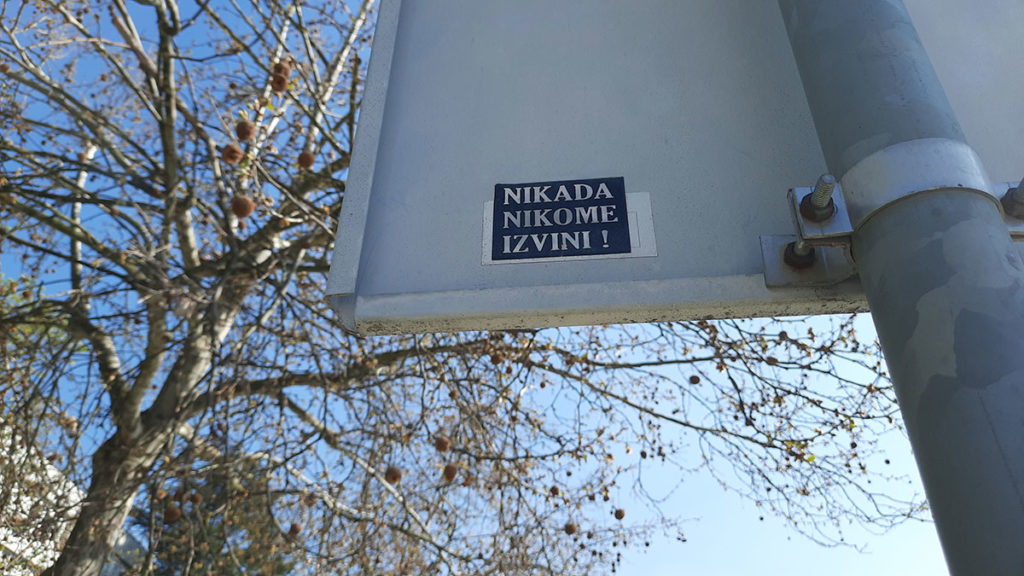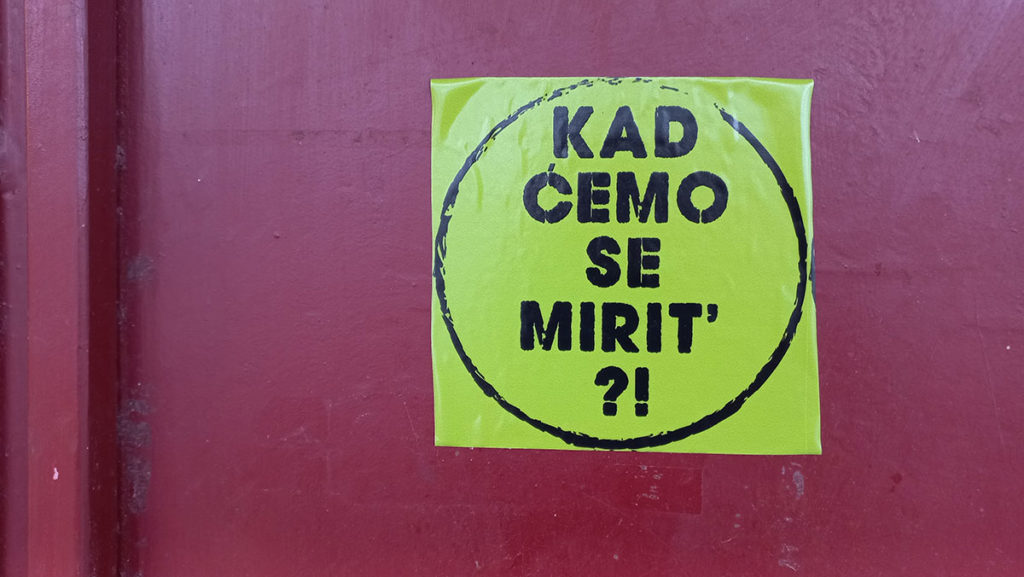
I find myself thinking of Nenad Dimitrijević, who often wrote for Peščanik, but who’s been gone a long time. On one occasion, when he wrote about the Serbian wars in Bosnia and Herzegovina, the terrible crimes and genocide which were committed in Srebrenica, he said that a simple “I’m sorry” from representatives of Serbia would be enough to begin the reconciliation. But it never came. And as things stand, with this year’s frenzied celebration of the anniversary of the founding of Republika Srpska on St. Stephen’s Day on January 9, this little phrase seems further than ever. In the year of 2024, three decades after the war, apologizing to the Bosniaks for the crimes committed is out of the question for Serbian officials.
In the past, the main topic in certain circles in Belgrade was confronting the past, more precisely the crimes committed by Serbs against Bosniaks, but extensive and authentic records were kept of all crimes committed, primarily by the Fund for Humanitarian Law in Belgrade, but also organizations in Sarajevo and Zagreb.
This is a regular topic of Peščanik’s articles, shows and public discussions. Every year, an episode of the show is dedicated to the genocide in Srebrenica on July 11, with authentic witnesses as guests. I also wrote about these topics, especially about the suffering of Muslims in Prijedor, which I will mention again at the end of this article.
The current government in Serbia has worked hard to ensure that Serbia falls not only into total oblivion about what happened in the nineties in Bosnia and Herzegovina, but also to make Ratko Mladić, sentenced to life imprisonment for the crime of genocide in Srebrenica, a hero, by installing his mural in Njegoševa Street, in the very center of Belgrade. The mural was guarded day and night against possible damage from protestors. Two brave and revolted women threw eggs at the mural one night, were arrested for it, and one of them, Aida Ćorović, was fined 100,000 dinars. That mural set off an avalanche of reactions, causing more graffiti praising Ratko Mladić to pop up all around the city.
With the Dayton peace agreement, Serbia recognized B&H, albeit only formally, while, in reality, it continues to treat Republika Srpska as its wartime booty. This merry-go-round between formal recognition and factual non-recognition was given the greatest impetus by the neo-Radicals of SNS headed by Vučić, with wholehearted help from the Serbian Orthodox Church headed by the patriarch Porfirije. The President of Republika Srpska, Milorad Dodik, who has been constantly threatening to secede, received external support from Russian President Putin. The two meet regularly, although Putin seems to doze off in each of those meetings. Putin also awarded Dodik a medal, the same one Vučić was given some time ago. I want to stress that Vučić has visited Putin 19 times, while Putin’s picture has been smiling at us from newsstands on the front pages of Vučić’s numerous tabloids for ten years now.
It is painful to read about the Banja Luka celebration of the 32nd birthday of Republika Srpska. Dodik says that RS was created in the struggle for freedom of the Serbian people, which cost Serbs 30,000 lives. He never thinks to mention the 100,000 killed Bosniaks. But, he did remember to mention “foreign colonizers who beheaded RS by imprisoning its entire political and military leadership. Leaders like Radovan Karadžić, Ratko Mladić, Biljana Plavšić and Momčilo Krajišnik, who led the Republic in the most difficult circumstances, were taken from us. The Republic will never forget their contribution”. The people he mentioned are still in prison at the Hague Tribunal. Except for Biljana Plavšić, who at first repented, but then took it back.
The ceremonial celebration called “Symbol of Freedom” in the Borik Sports Hall in Banja Luka was attended by Patriarch Porfirije, member of the B&H Presidency Željka Cvijanović, President of the National Assembly of RS Nenad Stevandić, President of the Serbian Parliament Vladimir Orlić, MPs and Ministers in the Government of Serbia Miloš Vučević, Danica Grujičić, Mihailo Jovanović, Nikola Selaković and Zoran Gajić. Dodik also gave a speech. He denied the genocide, referring to false attributions of genocidal aspirations to the Serbian people (which no one has ever claimed or attributed to the Serbian people), and the mention of Radovan Karadžić and Ratko Mladić was greeted with long-lasting applause.
I learned about the fate of the city of Prijedor at the very beginning of the wars. I happened to be in the editorial office of the weekly newspaper Vreme when a young man entered, quite nervous, and started telling a story about Prijedor. He said that the Serbs had killed thousands of Muslims, mostly those who were craftsmen and professionals. His parents were killed, and he managed to escape and was on his way to Turkey. We learned much more about the massacre later. Including that the mayor of Prijedor, a Serb, ordered Bosniaks and Croats to wear white armbands around their sleeves, which was almost automatically associated with the yellow armbands worn by Jews in Hitler’s Germany. I wrote about the white armbands here on one of the anniversaries of the massacre in Prijedor.
I thought about Prijedor again last summer on the anniversary of Operation Storm, in which on August 4, 1995, about 200,000 Serbs were expelled/escaped from Croatia in the infamous tractor convoy. The commemoration of Operation Storm was regularly held in Belgrade, but in 2023 it was unexpectedly and without explanation moved to RS, namely Prijedor. It was not easy to guess why the city infamous for crimes against Bosniak was chosen to commemorate Serbian martyrdom, but it soon became clear. The Petrovac road, along which a convoy of Serbian refugees traveled, passes by Prijedor. On that occasion, the Croatian armed forces bombed the convoy without any reason, killing many, including children, and committing a serious war crime for which the trial has not yet begun.1
Vučić laid flowers on the Petrovac road in memory of the murdered children. I asked Nataša Kandić for information about that event. She told me that 3 456 Muslims were killed in Prijedor, out of which 102 were children. Was it not possible to put some flowers down for those children as well? No, because in order for that to happen, somebody would need to say “I’m sorry” first. We shouldn’t give up on this, which is why I am reminding you of it now, while these crimes and their perpetrators are still being ostentatiously celebrated.

Translated by Marijana Simić
Peščanik.net, 15.01.2024.
________________
- The Croatian government, its Minister of Justice and President Zoran Milanović are asking the Serbian authorities in Belgrade not to try the Croatian pilots for the crime on the Petrovac road, and in return they are offering to suspend the proceedings for the bombing of Banski dvori in Zagreb. That exchange of crimes is based on an identical procedural situation in both cases. Trials are postponed due to unfulfilled procedural conditions, as there is no evidence that the defendants were served with summons, although in both cases the conditions for a trial in absentia were met. Thus, neither trial can start. (Stated according to an article in Politika, dated January 10, 2024.)
- Biografija
- Latest Posts
Vesna Pešić, političarka, borkinja za ljudska prava i antiratna aktivistkinja, sociološkinja. Diplomirala na Filozofskom fakultetu u Beogradu, doktorirala na Pravnom, radila u Institutu za društvene nauke i Institutu za filozofiju i društvenu teoriju, bila profesorka sociologije. Od 70-ih pripada peticionaškom pokretu, 1982. bila zatvarana sa grupom disidenata. 1985. osnivačica Jugoslovenskog helsinškog komiteta. 1989. članica Udruženja za jugoslovensku demokratsku inicijativu. 1991. članica Evropskog pokreta u Jugoslaviji. 1991. osniva Centar za antiratnu akciju, prvu mirovnu organizaciju u Srbiji. 1992-1999. osnivačica i predsednica Građanskog saveza Srbije (GSS), nastalog ujedinjenjem Republikanskog kluba i Reformske stranke, sukcesora Saveza reformskih snaga Jugoslavije Ante Markovića. 1993-1997. jedna od vođa Koalicije Zajedno (sa Zoranom Đinđićem i Vukom Draškovićem). 2001-2005. ambasadorka SR Jugoslavije, pa SCG u Meksiku. Posle gašenja GSS 2007, njegovim prelaskom u Liberalno-demokratsku partiju (LDP), do 2011. predsednica Političkog saveta LDP-a, kada napušta ovu partiju. Narodna poslanica (1993-1997, 2007-2012).
Latest posts by Vesna Pešić (see all)
- An untold (secret) story - 09/02/2024
- Jedna neispričana (tajna) priča - 06/02/2024
- Never say sorry - 15/01/2024


